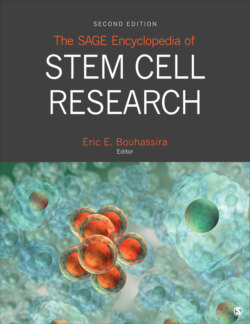Читать книгу The SAGE Encyclopedia of Stem Cell Research - Группа авторов - Страница 400
На сайте Литреса книга снята с продажи.
Mesenchymal SC Treatments for Heart Disease
ОглавлениеNon-hematopoietic SCs in adult BM are called stromal or mesenchymal cells. Mesenchymal stem cells (MSCs) have the capacity for self-renewal and multi-lineage differentiation to generate bone, cartilage, fibrous connective tissue, even myocytes. Although MSCs represent only 1 percent of nucleated cells in BM, in vitro culture expansion can successfully generate sufficient cells for timely therapeutic potential, and harvest of MSCs from other sources, such as adipose tissue and even allogenic sources, is also possible. To treat heart disease, MSCs demonstrate promise to graft into a variety of cell types, including vascular smooth muscle and endothelial, which improve cardiovascular function through neovascularization, secretion of growth factors, cytokines, and other signaling molecules. Transdifferention has been shown to occur both in vitro to cardiomyocytes as well as in vivo to cardiomyocytes when among naïve cardiomyocytes.
Several MSC-therapy clinical trials, including the TAC-HFT trial at the University of Miami, also found results of improved LV function, as well as reverse ischemic remodeling and decreased post-AMI size. The POSEIDON trial at the University of Miami established MSCs’ autologous and allogenic safety and efficacy in treatment of early-stage IHD, and found that patients who received low-dose treatment of MSCs (20 million cells) presented with the most favorable reductions in LV volume and increased EF. Clinical trials for autologous adipose-derived MSCs have not begun in the United States but show promise internationally, such as in the APOLLO trial.
